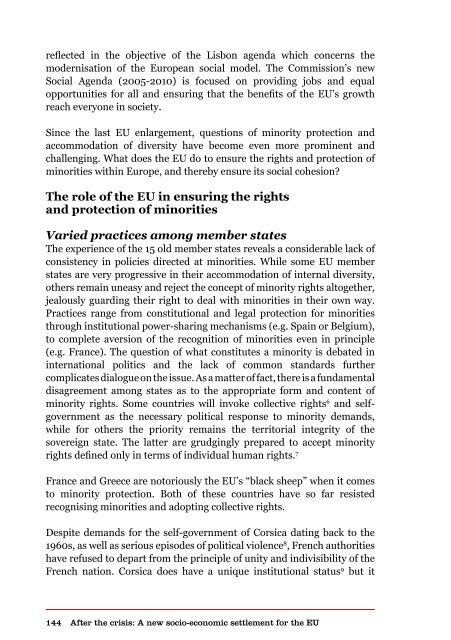Authors Iain Begg | Gabriel Glöckler | Anke Hassel ... - The Europaeum
Authors Iain Begg | Gabriel Glöckler | Anke Hassel ... - The Europaeum
Authors Iain Begg | Gabriel Glöckler | Anke Hassel ... - The Europaeum
You also want an ePaper? Increase the reach of your titles
YUMPU automatically turns print PDFs into web optimized ePapers that Google loves.
eflected in the objective of the Lisbon agenda which concerns the<br />
modernisation of the European social model. <strong>The</strong> Commission’s new<br />
Social Agenda (2005-2010) is focused on providing jobs and equal<br />
opportunities for all and ensuring that the benefits of the EU’s growth<br />
reach everyone in society.<br />
Since the last EU enlargement, questions of minority protection and<br />
accommodation of diversity have become even more prominent and<br />
challenging. What does the EU do to ensure the rights and protection of<br />
minorities within Europe, and thereby ensure its social cohesion?<br />
<strong>The</strong> role of the EU in ensuring the rights<br />
and protection of minorities<br />
Varied practices among member states<br />
<strong>The</strong> experience of the 15 old member states reveals a considerable lack of<br />
consistency in policies directed at minorities. While some EU member<br />
states are very progressive in their accommodation of internal diversity,<br />
others remain uneasy and reject the concept of minority rights altogether,<br />
jealously guarding their right to deal with minorities in their own way.<br />
Practices range from constitutional and legal protection for minorities<br />
through institutional power-sharing mechanisms (e.g. Spain or Belgium),<br />
to complete aversion of the recognition of minorities even in principle<br />
(e.g. France). <strong>The</strong> question of what constitutes a minority is debated in<br />
international politics and the lack of common standards further<br />
complicates dialogue on the issue. As a matter of fact, there is a fundamental<br />
disagreement among states as to the appropriate form and content of<br />
minority rights. Some countries will invoke collective rights 6 and selfgovernment<br />
as the necessary political response to minority demands,<br />
while for others the priority remains the territorial integrity of the<br />
sovereign state. <strong>The</strong> latter are grudgingly prepared to accept minority<br />
rights defined only in terms of individual human rights. 7<br />
France and Greece are notoriously the EU’s “black sheep” when it comes<br />
to minority protection. Both of these countries have so far resisted<br />
recognising minorities and adopting collective rights.<br />
Despite demands for the self-government of Corsica dating back to the<br />
1960s, as well as serious episodes of political violence 8 , French authorities<br />
have refused to depart from the principle of unity and indivisibility of the<br />
French nation. Corsica does have a unique institutional status 9 but it<br />
144<br />
After the crisis: A new socio-economic settlement for the EU

















